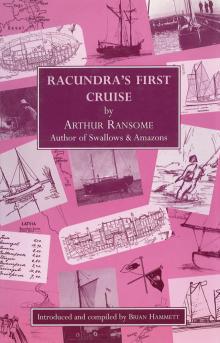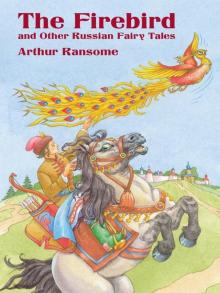- Home
- Arthur Ransome
Peter Duck: A Treasure Hunt in the Caribbees Page 2
Peter Duck: A Treasure Hunt in the Caribbees Read online
Page 2
Susan stared with surprise when Captain Flint and Peggy proudly flung open one cupboard after another.
“Pemmican,” said Peggy. “We’ve pemmican for a year at least and jam enough for ten.”
“But isn’t it rather a waste?” said Susan.
“It’ll keep,” said Captain Flint. “And what do you think we’ve got under the floor?” he asked.
“Ballast,” said John.
“Water tanks,” said Captain Flint. “You can’t have better ballast than that, and you never know when you won’t be glad to be able to drink it.”
“It isn’t that he means to go very far,” said Nancy, “but he just likes to feel he could.”
“And now, thanks to Sam Bideford not coming we can’t start at all,” said Captain Flint. “But there’s nothing against having dinner. I don’t know about you people, but I’m ready for it.”
*
Every now and then shouts of laughter floated up through the skylights, but as time went on there were not so many, and when dinner was over and the whole ship’s company came crowding out on deck again, they were talking seriously enough.
“Couldn’t we manage by ourselves?” Nancy was saying.
“You could show us what to do,” said John.
“Look here,” said Captain Flint, “it’s no good talking about it. You and John are a couple of very good sailors, and no one could ask for better cooks than the two mates, and I’ve nothing whatever against the able-seaman and the boy, but the Wild Cat is a very different ship from the Swallow or the Amazon, and if we’re to do anything with her worth doing I must have another man aboard who can take watch and watch about with me.…”
And at that moment Peter Duck tapped his pipe out on his bollard, got up, walked to the edge of the quay and said, “Cap’n!”
Captain Flint looked up at the wrinkled, brown old sailor.
“Cap’n,” said Peter Duck, “can I have a word with you?”
“Why, yes,” said Captain Flint. “There’s the ladder.”
Peter Duck climbed quickly down to the deck of the Wild Cat. The others stood there watching him, and wondering what it was he was going to say.
“It’s like this, Cap’n,” said the old sailor. “The last few days I’ve been thinking a deal of your little schooner, and the more I looks at her the more I likes her. Now I’d like well to be seeing blue water once again, and I’ve been turning it over, as you might say, and I’d like to ask you plain out if it’s in your mind to be shipping a crew?”
John and Nancy looked at each other with a flash of hope. But it seemed too good to be true. What would Captain Flint say?
“A crew?” said Captain Flint. “Why, we’ve got three captains counting myself, and two mates and an able-seaman and a ship’s boy and a ship’s parrot and a monkey.”
“I seen them,” said the old sailor. “Now me, I’d be glad to sign on as an A.B. It wouldn’t be a bad thing to have an able-seaman to each mate.”
Captain Flint laughed. “As a matter of fact,” he said, “we are one man short. But are you an able-seaman? I know nothing about you, you know. You haven’t yet told me your name.”
“Duck’s my name,” said the old man. “Peter Duck, and Duck’s my nature, and I’ve been afloat as you might say, ever since I were a duckling. I’ve been on inland waters these last years, but I’m a deep sea man properly. Sailed in the Thermopylae …”
“Sailed in the what?” Captain Flint eagerly caught him up.
“The old Thermopylae,” said Peter Duck. “There’s few A.B.’s with as much experience as what I have. Sixty years of it, and maybe then a bit more.”
“A fine ship,” said Captain Flint.
“If you be thinking it over, Cap’n,” said the old sailor, “and if it’s all the same to you, I seen a block up there that’s like to come adrift, and, sign on or not sign on, I might as well be putting a whipping on it.” His hands were already on the halyards and before they guessed what he was thinking of doing he had begun climbing up the mainmast. A minute later he had hitched a leg over the cross-trees. Then he pulled a knife and some twine out of his pocket and they could see him busy up there far above their heads.
“Well?” said Nancy. “How about that?”
Captain Flint said nothing. He was shading his eyes against the sunshine, looking up at the mast-head to watch what Peter Duck was doing.
Just then Roger, who had been exploring under the deckhouse, trying to get a look at the little engine that was tucked away down there, came rushing up for fear he was missing anything on deck.
Like all the others he looked up at the masthead. “Hullo,” he said, “what’s he doing?” but did not wait to be answered. His eyes were all over the place. There was such a lot to see in this harbour. He looked at the swing bridge, closed now, with carts and motor cars and people going across it. He looked along the quay to the Custom-House with the big crest over the doorway, and beyond it the tall masts of the fishing vessels. He looked up the inner harbour towards the dry dock, where a steam trawler was being repaired and there was a great noise of men chipping rust and riveting. And then his eyes rested on that other schooner on the opposite side of the harbour, the black schooner that was tied up against the south quay. There were men taking stores aboard her, or cargo, Roger thought, and suddenly he caught sight of a man he knew on the black schooner’s deck.
“Hullo,” he said. “There’s the man who tried to be beastly about Titty’s parrot. The man with the ear-rings.”
“Where?” said Titty.
“Over there. On that ship. He’s seen us. He’s looking at us with a telescope.”
“He’s wondering what’s being done to our mast,” said John.
But Peter Duck was coming down now, hand over hand, faster than he went up, with his legs about the mast to steady himself.
“Good enough,” said Captain Flint. “In the Thermopylae, I think you said? There’ve been few ships to touch her. I think we might fix something up together. But you’d better meet the rest of us. This is Captain John. This is Captain Nancy. Both have commanded their own vessels. This is Able-seaman Titty. This is Roger, the ship’s boy. Where are the mates? Great hands at cooking are our mates. Ah, here they are. Mate Susan of the Swallow and Mate Peggy of the Amazon. This is Mr Duck, who’s thinking of coming down Channel with us …”
“Down Channel, sir?” said Peter Duck. “But I made sure you was going foreign.”
“No reason why we shouldn’t,” said Captain Flint, “if we all get on together. We’ve got no plans as yet.”
“It was blue water as I was thinking of,” said Peter Duck.
“You think we’re fit for it?”
“She’s a tough little packet is yours,” said Peter Duck, “and two men and a boy could take her anywheres.”
“What about girls?” said Nancy rather fiercely.
“I don’t count captains girls,” said Peter Duck, “nor mates neither, nor yet able-seamen. And I’ve three girls myself, all proper sailormen, though they’re settled down now and got families.”
Nancy laughed. “That’s all right,” she said. “Some people don’t understand.”
“How soon could you join?” asked Captain Flint.
Everybody listened. Peter Duck thought for a moment before answering.
“It’s like this,” he said. “I’ve a vessel of my own to lay up before I can sail with you. Lying at Oulton she is, my old wherry, and I must sail her up to Beccles and leave all snug with one of my daughters for to keep an eye on her while I’m away. All that takes time. And then there’s my things to put together. It’s a good while now since I last went to sea.”
Faces fell once more. Perhaps after all it would be days and days before they could be starting.
Peter Duck went on. He looked up and sniffed the air and glanced at the vane over the Custom-House. “But there’s a right wind for Beccles now, and she’s a flyer is my old wherry. Arrow of Norwich, they call her. Everybody knows o
f her. I don’t say but what I might be back here with my dunnage tomorrow morning, and you’ll hardly be sailing before then. There’s best part of a day’s work to do on the rigging, seems to me.”
Captain Flint laughed. “I thought you were going to say the week after next. That’s all right. You’re the man for us, if you think you won’t mind cramming into the deckhouse with me. You and I ought to be handy for the wheel ….”
A few minutes later Captain Flint and Peter Duck were walking off together along the quay to the harbourmaster’s office.
“Well, that’s just saved us,” said Nancy.
“And isn’t Peter Duck a lovely name?” said Titty.
“That man’s still got his telescope,” said Roger. “But he isn’t pointing it at us now. He’s watching Captain Flint walking along the quay.”
They looked across the water to the black schooner. The man who had been angry with the parrot was standing on the deck with a telescope to his eye, watching Captain Flint and Peter Duck, who were just turning into the harbourmaster’s office.
Captain Flint came back alone. He was in the highest spirits.
“We simply couldn’t have done better,” he was saying. “The harbourmaster tells me that that old man’s the best seaman that’s ever shipped out of Lowestoft. The Thermopylae! We shall know something about sailing when that old fellow has finished with us. And now we can start the moment we’re ready. Trial trip tomorrow. Well, anyway, the day after. I was thoroughly bothered when I heard Sam Bideford couldn’t come. What a bit of luck. An old sailor from the Thermopylae! Good enough for anybody.”
“What is the Thermopylae?” asked Roger.
“A fine clipper ship,” said Captain Flint. “She was named after a battle, a land battle, though, not like Salamis. Oh yes, Roger, we heard all about your picture of that, of Salamis, 1 mean, and how you put funnels on all the triremes. You’ll be an engineer before ever you’ll be a sailor. You’ve been at the engine already in this ship .…”
Roger grinned a little shyly. “How do you know?” he asked.
“One large smudge of grease on your left cheek,” said Captain Flint. “There’s nowhere else you could have got it. Simple, eh? Well, come along now and have another look at it. And get your things stowed in your cabins, you others. We’ve a lot to do before Mr Duck comes aboard in the morning.”
The rest of the day was busy for everybody. The old sailor, Peter Duck, was sailing the Arrow of Norwich up to Beccles, and wondering what his daughter there would say when she heard that her old father was going to sea once more. Aboard the green schooner Roger had been appointed engineer. He was oiling the engine, and Gibber the monkey was following him round with an oil-can, copying him in everything, and dripping oil on likely places. A board had been slung over the stern, and John was sitting on it with a tin of white paint and a brush, painting in the name “WILD CAT LOWESTOFT” in good big letters. Peggy and Susan were going through the stores and getting things into working order in the little galley at the forward end of the deckhouse, where they were to cook. Nancy and Titty were polishing up the brasswork and talking of old times. Captain Flint was lending a hand here, there, and everywhere. The parrot was practising his words. And away there on the black schooner at the other side of the harbour. Black Jake, that dark, scowling man with the black ringlets and the gold ear-rings, was watching all that was going on through his long telescope.
1 The davits are a pair of little cranes for hoisting and lowering a boat. – CAPT. NANCY.
CHAPTER II
RED-HAIRED BOY
“WELL,” SAID NANCY, “how did you sleep?”
“Very well, thank you,” said Titty, who was just bringing the parrot up on deck. Every one of them could have said the same. They had all slept very well, though they had been long in getting to sleep that first night. Voices had called from cabin to cabin. Top bunk spoke to lower bunk. Lower bunk had something urgent to say to top. Then there had been the creaking of the fenders between the schooner and the quay. There had been the noise of a passing tug. There had been the noise of someone in a rowing boat going home late at night to one of the ketches moored higher up the harbour. It had seemed almost wasteful to go to sleep, but, once they slept they had slept well, and waked up fresh and eager for their life aboard ship.
Peggy and Susan were busy in the galley. Peggy had already been ashore for a quart of new milk. Captain Flint was shaving in the deckhouse. John was looking into Swallow, to see that all was ready. Captain Flint had promised that if there was time, they should lower her into the water and go sailing in Lowestoft harbour. John and Titty had been wanting to do that from the moment they saw her, but had hardly liked to suggest it when there was so much to be done in getting the Wild Cat ready for sea. Roger was prowling round the decks, looking at one thing after another. Gibber, the monkey, was up at the top of the foremast looking away towards the fishing vessels. So many masts all together reminded him perhaps of forests at home. Titty put the parrot’s cage on the roof of the deckhouse, and went round with Nancy to have a look at the little sailing boat.
“She looks lovely in her new paint,” said Titty.
“He’s given her new halyards, too,” said John.
“There’s that man,” said Roger.
They looked across the water to the black schooner. The man whom the porter had called Black Jake was leaning over her bulwarks and watching them.
“Hullo! There’s a boy up the mast there. He isn’t as high up as Gibber though.”
There was a red-haired boy, not as big as John, but a good deal bigger than Roger, halfway up the black schooner’s mainmast, and busy with a scrubbing brush and a pail.
“He’s a cabin-boy or something,” said Nancy. “We’ve often seen him before.”
“I bet he has a horrid time,” said John. “The porter said we were lucky not to be joining that ship.”
But just then, there was a sudden stir on the black schooner’s deck. A man doing something at the foot of the foremast shouted something and pointed across towards the harbourmaster’s office. Black Jake started up and stared in that direction. Then he climbed up to the quay and set off, running, towards the swing bridge.
“What’s the matter with him now?” said Roger.
The next minute there was a general rush along the deck of the Wild Cat. John, Nancy, Titty, and Roger, as well as Black Jake, had seen the old sailor with a huge canvas kitbag on his back, who was hurrying along the quay past the Custom-House.
They banged on the deckhouse door.
“He’s back! He’s here! Mr Duck’s back again!”
Captain Flint came out in a hurry, drying his chin.
“Good for him,” he said. “Where is he?”
Peter Duck came to the edge of the quay and rolled his kitbag off his shoulder. It fell with a thud on the deck, and was followed by a bundle of oilskins. He came slowly down the ladder in his big sea-boots, that he was wearing to save having to carry them.
“Come aboard, sir,” he said.
“Fine,” said Captain Flint, shaking hands with him. “We’re all very glad to see you.”
“You’re just in time for breakfast,” said Susan, putting her head out of the galley. “At least, it’ll be ready in two minutes. The water must be just going to boil.”
Outside there, on deck, nobody, not even Captain Flint, could take his eyes from Peter Duck’s kitbag. It was an ordinary canvas kitbag, but it had a large coat of arms painted on it. There was a shield divided into four quarters. In one were three ducks swimming on curly waves. In another was a Norfolk wherry under full sail. In the third were three flying-fish, and in the fourth were three dolphins. Above the shield, by way of a crest, there was a capstan with a turn or two of rope about it, and below the shield in big clear letters was written “Admiral Peter Duck.”
The old sailor laughed when he saw what they were looking at. “It’s a long while ago since that was painted,” he said. “We had three days’ calm in the Ch
ina seas and all the fo’c’sle took to painting coats of arms, because the fish wasn’t biting.”
“And are you really an admiral?” asked Titty.
“Why not?” said Peter Duck. “The cook in that vessel was a rare good hand at dragons. So he painted dragons in all four corners of his shield and called himself the Emperor of China.”
Just then Roger pulled at Titty. “There’s that man again,” he whispered. “He’s come right round.”
Titty looked up, startled. The others, seeing her, looked up, too.
A man was standing on the edge of the quay, right above them, a dark man, with black hair and big gold ear-rings that showed below his hair. He stood there glowering down at the little group on the deck of the Wild Cat. Peter Duck glanced up at him. The man opened his lips, but he did not say a word.
“Pieces of eight! Pieces of eight!” screamed the parrot in the sunshine.
The man scowled, turned sharp round and walked hurriedly away.
“What on earth’s the matter with that man?” said Captain Flint.
“It’s the sort of man he is,” said Peter Duck.
“Roger’s quite right,” said Titty. “He is the man who tried to grab the parrot when we were coming from the station.”
“He didn’t exactly grab it,” said John. “He just got angry and wouldn’t leave us alone.”
“He was watching us from the boat,” said Roger.
“He owns her,” said Peter Duck.
“Hullo, is she still there?” said Captain Flint. “The harbourmaster told me she was sailing last night.”

 Peter Duck: A Treasure Hunt in the Caribbees
Peter Duck: A Treasure Hunt in the Caribbees Racundra's First Cruise
Racundra's First Cruise Great Northern?
Great Northern? Swallowdale
Swallowdale Swallows and Amazons
Swallows and Amazons Winter Holiday
Winter Holiday Missee Lee: The Swallows and Amazons in the China Seas
Missee Lee: The Swallows and Amazons in the China Seas Pigeon Post
Pigeon Post We Didn't Mean to Go to Sea
We Didn't Mean to Go to Sea The Firebird and Other Russian Fairy Tales
The Firebird and Other Russian Fairy Tales Coot Club
Coot Club The Big Six: A Novel
The Big Six: A Novel Six Weeks in Russia, 1919
Six Weeks in Russia, 1919 Secret Water
Secret Water The Big Six
The Big Six Missee Lee
Missee Lee Peter Duck
Peter Duck The Picts and the Martyrs
The Picts and the Martyrs